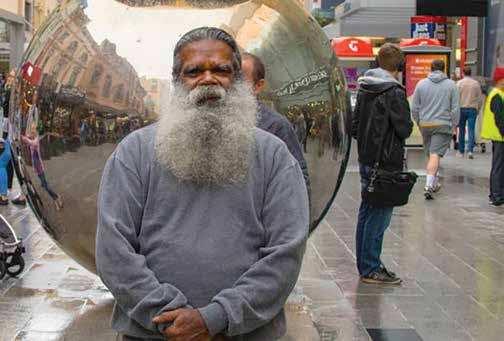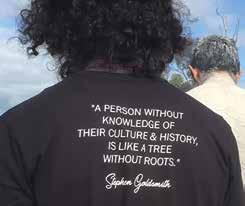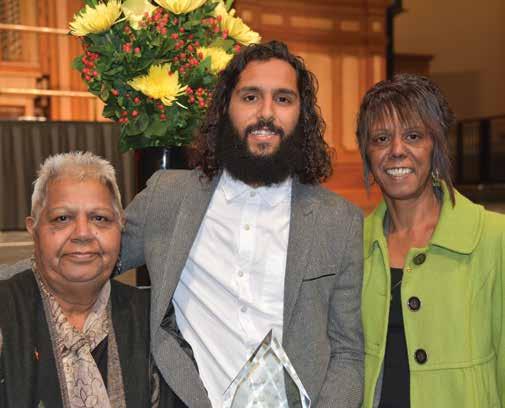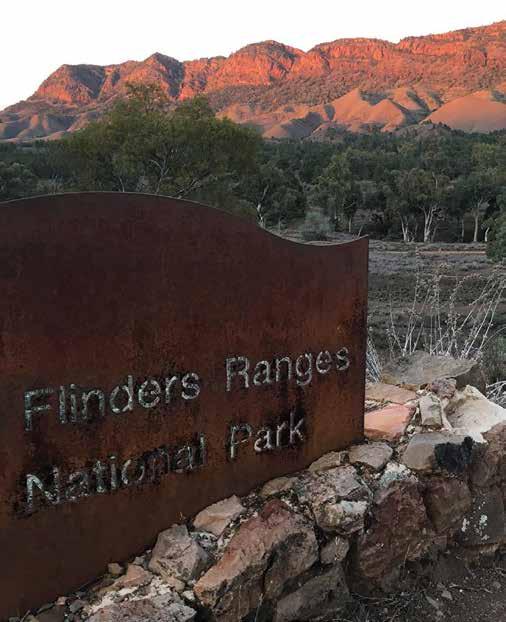
10 minute read
New approach to prisons needed
South Australia is long overdue for a new approach to prisons and reoffending according to one tireless community volunteer. Her comments come as the Government launches a major reform to corrections policy in the state.
Heather Agius was awarded SA Female Elder of the Year at the 2017 SA NAIDOC Awards. Her award was in recognition of many years of work with Aboriginal people in the justice system. Mrs Agius works at the Nunga Court and at ‘9C’ hearings, both mechanisms designed specifically for the sentencing of Aboriginal people accused of crimes. She also works at the Aboriginal Legal Rights Movement (ALRM) as an AVS worker and is a visiting inspector in prisons. She has seen first-hand the challenges faced by offenders, particularly young Aboriginal offenders in the South Australian corrections system. “It’s very hard for people, some who have been there very young. It’s very scary for them. And they don’t talk a lot. They don’t express themselves a lot, they’re frightened and they’re very cautious about speaking to anybody.”
Advertisement
According to Mrs Agius, offending is often influenced by difficult backgrounds and once in the system, offenders receive very little support or advocacy.
“One young lad I did a 9C for, and there was nothing for him.
“He was a very quiet lad, his mother had been on drugs, and he didn’t want to say anything about his mother that was bad,
“I explained to him that he needed to tell the judge that he is not bagging his mother or talking bad about his mother. It’s just what he’s had to deal with in that life that he had been in.
“There were just a lot of things that he hadn’t learnt. He was just existing in that life. There was no door opened for him to change his life, so he was just existing” she said. Mrs Agius believes that more support and education would enable offenders to change their lifestyle and reduce reoffending across the community. “If that young man had had a case worker, they would have done a whole lot of things, and paid attention to housing, support, dealing with the drug issue. “There needs to be life skill programs. There needs to be education. A lot of the guys don’t access education because it’s a shame job, they may not even know their ABC, so it’s about trying to get them to move to another level in their lives but they don’t because of the shame. “I try to encourage them to do it, because it’s about getting out of the rut that they are in” she said Currently once people leave prison there is very little support available says Mrs Agius. “Well there’s none that I know of. We have ASG, which is the Aboriginal Sobriety Group who support people, there is one man is very good with the Aboriginal guys, doing case work with them and trying to get them on track. But he’s only one person and there’s not many others” she said. This situation makes re-offending common Mrs Agius says. “They keep going back because they haven’t been exposed to a different life style. You know once they’re in, and they’re with their mates, they come out and they’re with the same people, who are in the same positions that they are, in a very depressed state. And so often drugs are the only way out for them” she said. Her comments come as the State Government releases a report on the corrections service in South Australia. The report was written after a year-long review led by Warren Mundine. The Government says that Reducing Reoffending: 10% by 2020 marks a landmark change in correctional services policy in South Australia. The strategy will cost $40 million and includes initiatives in accommodation and support services for those released from prison, as well as education and training for those in prison. The Government says it will also support the development of an Aboriginal Framework for Correctional Services and the investigation of a Community Transition and learning centre to rehabilitate Aboriginal offenders from remote communities.
The select committee’s report was informed by input from an Aboriginal Reference Group – members were: Cheryl Axelby, CEO of ALRM, Sharon Gollan, Consultant, Paul Tanner, State Government Senior Aboriginal Justice Officer, Wayne Miller, Indigenous Community Engagement and Governance officer, Ceduna Aboriginal Corporation and Allan Jones, Managing Director of Aboriginal Recruitment Training and Employment (ART). On the release of the report, Chair Warren Mundine said that the perspective of Aboriginal people was central to the review. “Early on, we decided to appoint a separate Aboriginal Reference group to advise on factors specific to Aboriginal reoffending. This advice informed the development of all recommendations within the strategy, with seven recommendations specific to Aboriginal people.” On the release of the new Government strategy, Department of Correctional Services (DCS) Chief Executive David Brown said “It is no secret that the South Australian prison system has operated at capacity for some time now. “This growing incarceration rate, which includes high levels of reoffending, demonstrates a clear need to implement new responses that engage the broader sector in supporting offenders to live crime free lives.
“It is time for a new approach to stop the cycle of reoffending” he said.
Vale Stephen Goldsmith
The South Australian community was saddened by the sudden passing in July of a much-loved community leader and cultural educator – Stephen Goldsmith. Uncle Stevie was a proud Narungga and Kaurna man, an inspiration and friend to many. He was an important part of the revival of the Kaurna language through his work at the Kaurna Warra Pintyanthi (KWP) language unit at the University of Adelaide. He was an influential advisor at the Museum of South Australia and Art Gallery of South Australia. Uncle Stevie performed traditional dance with his Taikurtinna (“family”) dance group and played yidaki and delivered Welcomes to Country at countless events, including several Womads both in Adelaide and overseas. Through this work he helped ensure that culture was remembered, respected and represented. He was a well-known face due to his long career as an actor in advertising campaigns, TV and theatre, most recently in a widely admired performance in the Adelaide Festival production of The Secret River. Stephen Goldsmith was awarded Male Elder of the Year for 2017 at the Lord Mayor’s NAIDOC Awards, and the Premier acknowledged his contribution at the Premier’s 2017 NAIDOC Awards.
On his passing, tributes flowed in from South Australia, Australia and around the world. His beloved Crows paid public tribute to him and wore black armbands at the Showdown in August. Uncle Stevie will be remembered as a charismatic man who, through his warmth and disarming honesty was able to tear down bridges to make a huge personal contribution to strengthening culture and to reconciliation.


Heather Agius with Anthony Wilson and Winnie Warrior at 2017 Lord Mayor’s NAIODC Awards.
For more information on the Strategy https://yoursay.sa.gov.au/ decisions/yoursay-engagements10by20sa/about http://www.corrections.sa.gov.au/
Aboriginal Legal Rights Movement now a communit y-based corporation
After more than 40 years as a community association, South Australia’s Aboriginal Legal Rights Movement (ALRM) has changed its own legal foundation to become a corporation, but it will retain its community focus.
At a General Meeting held in Adelaide recently, it was formally agreed to change the status of the Movement from an Association to that of a Company Limited by Guarantee.
According to ALRM Chairperson Sandra Saunders, the change was necessary for the organisation to continue to receive funding from the Federal Government.
“Organisations which get funding under the Indigenous Legal Assistance Program Funding were told they need to be incorporated under The Office of the Registrar of Indigenous Corporations, known as ORIC” she explained. “The ALRM Board of Management found that the opportunities for the Movement under ORIC would be far more limited than our current structure.
“We considered all of the legal and community issues, in the end decided that it was better to change the status of the Movement to that of a Company Limited by Guarantee” she said. According to ALRM CEO Cheryl Axelby, the organisation will continue to be open to the community and make sure that opportunities for participation and membership of the Movement remain open.
“We are still all about our community and membership, and getting our mob involved, that won’t change” she told the meeting.
“We think the new structure will provide new opportunities for ALRM and our stakeholders, both in terms of our ability to grow and our ability to connect with community. One significant impact of the change is that Aboriginal South Australians will no longer automatically be members of the Movement, but need to apply to join. The ALRM welcomes and encourages all Aboriginal South Australians to apply to become members – contact the ALRM for an application form https://www.alrm.org.au/

ALRM Board members following the change of status – left to right: Michael Coughlan, Sandra Saunders (Chair), Sandra Miller and Lucy Evans.
Successes in shared management of country
Almost one hundred delegates met at Wilpena Pound in the Ikara-Flinders Ranges National Park in early September for a two-day workshop to discuss and develop co-management of parks in South Australia.
It was the third Co-management workshop that has been held in recent years, and it was hosted by the Ikara-Flinders Ranges National Park Co-management Board on Adnyamathanha country.
Co-management in South Australia is a partnership between the state Government and Aboriginal groups to manage national parks in a way that brings together traditional knowledge and contemporary park management practice.
Across the state there are eight comanagement boards and four advisory committees with management or advisory responsibilities for 35 parks, covering 13.5 million hectares, or 64 per cent of the state’s reserves.
Acting Environment and Conservation Minister Susan Close said that comanagement is strongly supported in South Australia.
“Co-management recognises Aboriginal people as the original custodians of the land and acknowledges the importance of the customs and knowledge that have been passed down through generations of Aboriginal South Australians.
“It also helps reconnect Aboriginal communities to their country, and supports culture, story-telling and language.
“We are committed to this partnership approach because of the great outcomes we have seen to date and the enormous opportunities it opens up in future” Minister Close said.
The workshop began with reflections by South Australian groups who have been involved in co-management. The Ikara-Flinders Ranges National Park Co-management Board and the Vulkathunha-Gammon Ranges National Park Co-management Board shared their thoughts on the journey so far. Delegates also heard from speakers from the New Zealand Department of Conservation, who gave a Maori perspective of joint management in that country.
The links between native title, Aboriginal Regional Authorities, Treaty and Co-management were discussed by SA Native Title Services (SANTS) CEO Keith Thomas.

Photos courtesy of Adealied Bushwalkers. He said that “many native title rights stem from laws, customs and practices embedded in and from country”.
Native title is about caring for country he said, and includes looking after important places, hunting and gathering, the use of fire, ceremony and cultural knowledge.
“The basis and viability of the native title group stems from and relies on the environment” he told delegates.
“Healthy country, health people, healthy culture is an apt description” he said.
He pointed out that co-management arrangements are often established alongside the determination of native title.
“This is because native title brings certainty as to who the Traditional Owners are for a certain area. It confirms ongoing physical, cultural and spiritual connection to country. National parks often represent important parts of country for native title groups. Co-existence and often mutual interests.
Looking ahead, Mr Thomas said that co-management faces challenges into the future, including issues of governance, relationships, ownership and leases, business opportunities and increasing Aboriginal employment.
He also said that handing over full management of parks must remain on the Government’s agenda.
“Legislation has enabled the establishment and operation of these boards, their success is evident, and ongoing capacity development should support handover” he said.




